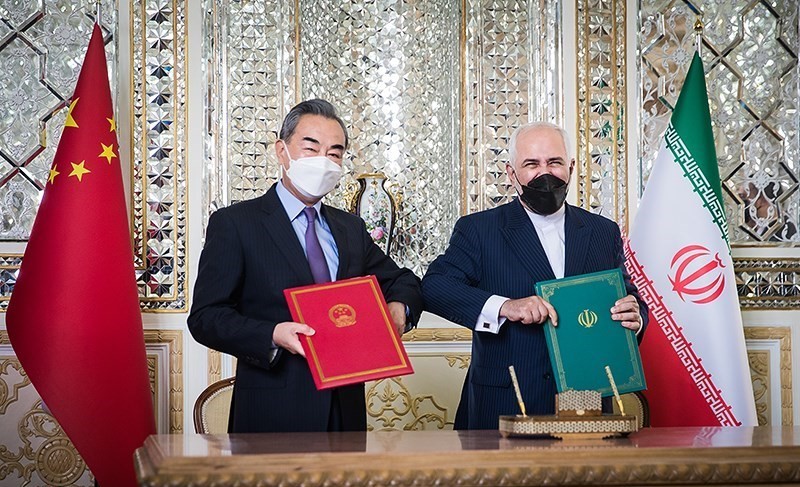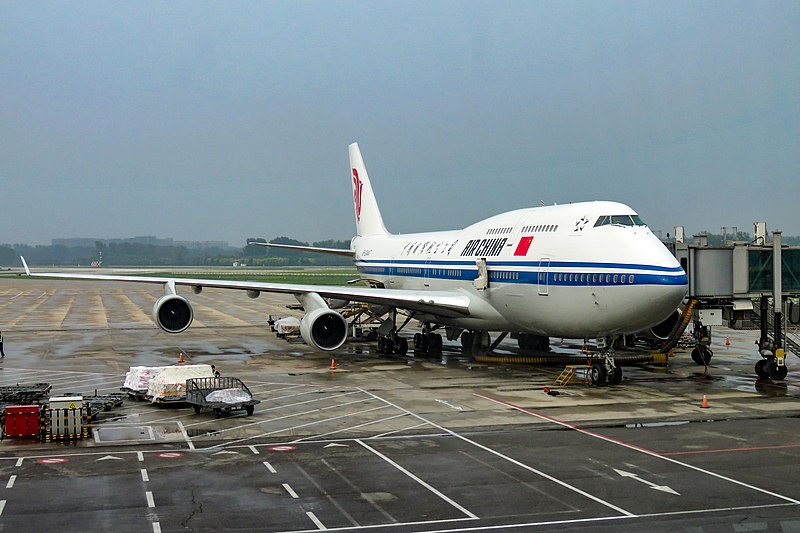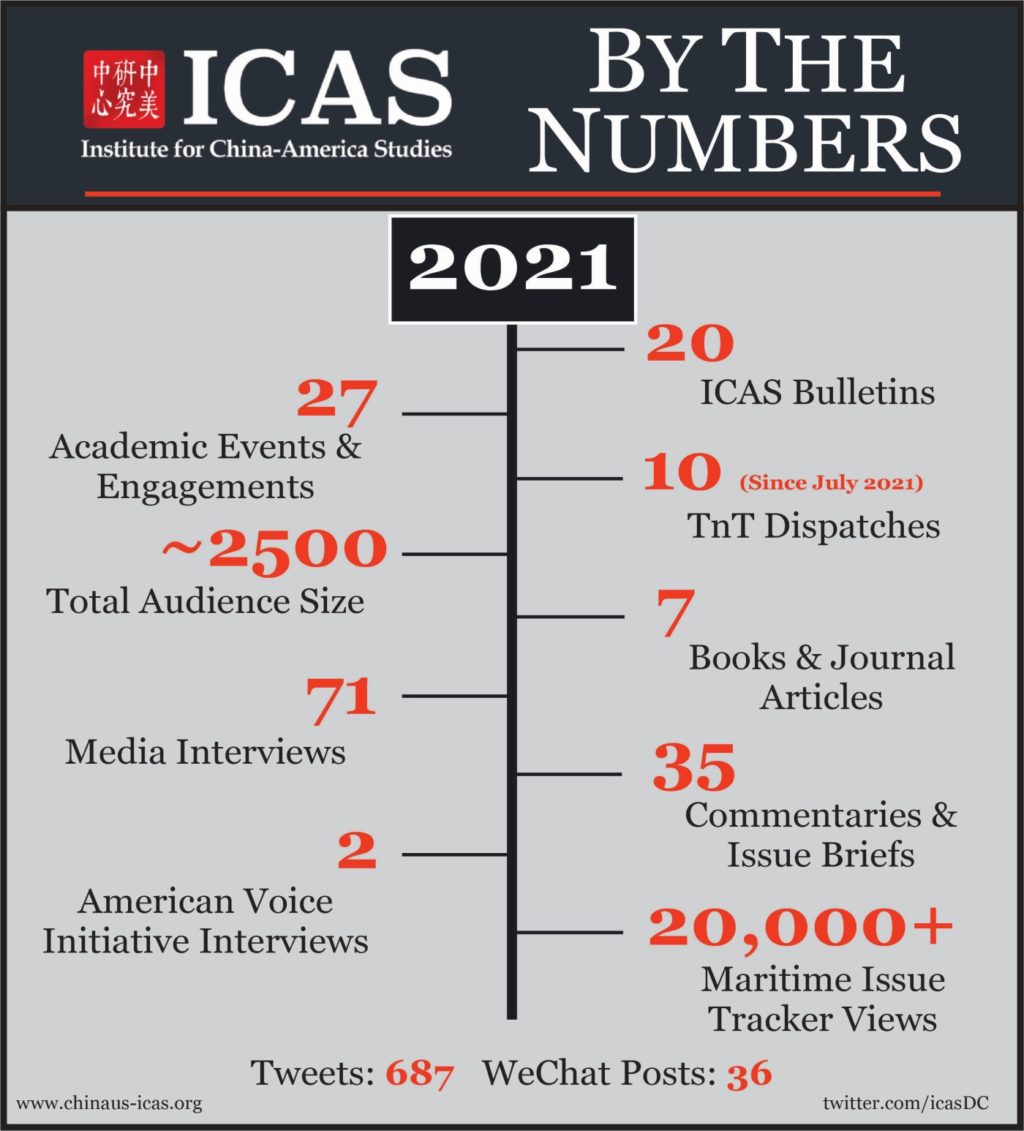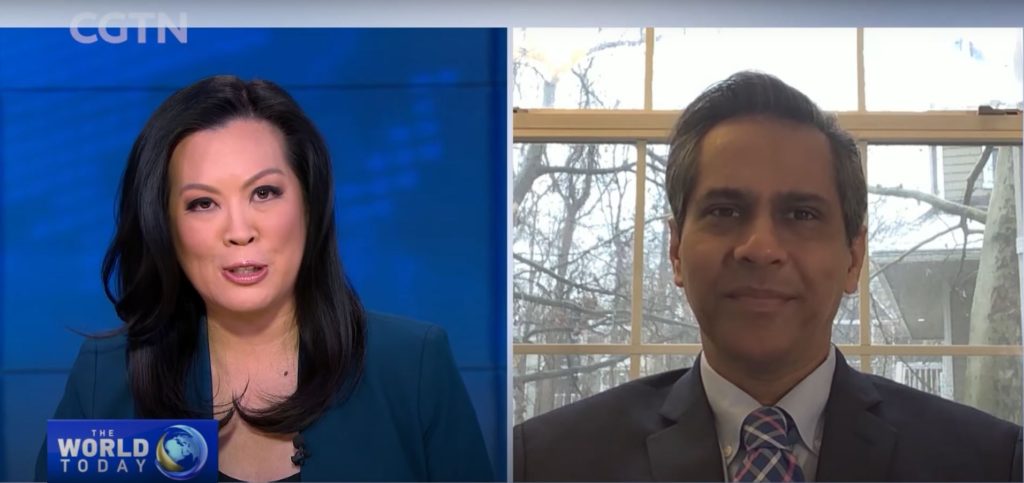
ICAS Bulletin (online ISSN 2836-3418, print ISSN 2836-340X) is published every other week throughout the year at 1919 M St NW, Suite 310, Washington, DC 20036.
The online version of ICAS Bulletin can be found at chinaus-icas.org/bulletins/.

– On January 18, it was reported that Poland’s President Andrzej Duda will attend the Beijing 2022 Winter Olympics and its officials said it’s no longer in Poland’s interests to continue criticizing China simply to please the Americans.
– On January 16, it was reported that some Olympic sponsors like Allianz and Intel are taking steps to divest from Xinjiang or raise the issue with the International Olympic Committee. However, the majority of sponsors have not responded to challenges from activists and, in the case of Coca Cola, an angry letter from House Republicans demanding their divestment from Xinjiang and a statement on other Chinese controversies.
– On January 14, the United States Olympic & Paralympic Committee advised athletes participating in the upcoming Winter Olympics to leave their phones at home citing the possibility of surveillance by Beijing during the games.
Associated News References:
“Poland’s president to attend Beijing Olympics amidst U.S. boycott,” Reuters, January 18 [Paywall]
“The U.S. government is boycotting the Beijing Olympics over human rights. Coke and Airbnb are still on board,” The Washington Post, January 16 [Paywall]
“The United States could lose all flights to China ahead of the Beijing Winter Olympics,” CNN, January 14
“Letter to James Quincey, Chairman and CEO of the Coca Cola Company,” Committee on Energy and Commerce of the U.S. House of Representatives, January 13
“Team USA Advises Athletes Heading to Beijing Olympics to Leave Their Phones at Home,” The Wall Street Journal, January 14 [Paywall]

– On January 18, Chinese Foreign Ministry spokesperson Zhao Lijian said China is preparing to send supplies to Tonga as soon as flights resume and The U.S. international aid agency also said that it is working with partners to provide relief supplies.
– On January 17, Chinese President Xi Jinping used his video appearance at The Davos Agenda to urge countries away from a “Cold War mentality,” warning that “Acts of containment, suppression or confrontation arising thereof do all harm, not the least good to world peace and security.”
– On January 15, Beijing reiterated its opposition to the U.S.’ unilateral sanctions on Iran at an announcement of a 25-year cooperation agreement with Tehran focusing on the areas of energy, infrastructure, agriculture, health care, culture, and cyber security.
Associated News References:
“Tonga covered in thick layer of ash, photos after volcano eruption and tsunami show,” NBC News, January 18
“Foreign Ministry Spokesperson Zhao Lijian’s Regular Press Conference on January 18, 2022 (Tonga assistance),” Embassy of the People’s Republic of China in the United States of America, January 18
“China’s Xi says countries must abandon ‘Cold War mentality,’ warns against confrontation,” CNBC, January 17
“China reaffirms opposition to US sanctions on Iran,” Al Jazeera, January 15

– On January 7, The U.S. and Japan resolved to “work together to deter and, if necessary, respond to destabilising activities” by China in the Asia-Pacific.
– On January 6, Chinese foreign ministry spokesperson Wang Wenbin responded to U.S. support for Lithuania by accusing Washington of trying to create “one China, one Taiwan…and put together a small clique condoning the Taiwan independence forces.”
– On January 5, United States Trade Representative Katherine Tai expressed the U.S continuing support for Lithuania to address “economic coercion” from China in a call with Lithuanian Foreign Minister Gabrielius Landsbergis.
Associated News References:
“Japan and U.S. vow more defence cooperation to counter Chinese threat,” Reuters, January 7 [Paywall]
“China lashes out at U.S. for supporting Lithuania in feud with Beijing over Taiwan,” National Public Radio, January 6 [Paywall]
“Readout of Ambassador Katherine Tai’s Call With Lithuanian Foreign Minister Gabrielius Landsbergis,” Office of the United States Trade Representative, January

– On January 10, the President of the Chinese-backed Asian Infrastructure Investment Bank (AIIB) announced that the bank will continue to focus on financing health care systems over infrastructure in its partner countries until the Covid-19 pandemic is over.
– On January 6, China announced that it will be appointing a peace envoy in the Horn of Africa to help broker an end to the ongoing conflict in the Tigray region of Ethiopia and coordinate the reconstruction of crucial regional infrastructure.
– Latin America watchers are ringing alarm bells after a late 2021 meeting of the China–Latin America-Caribbean Forum (CELAC) resolved to deepen cooperation on several fronts including digital infrastructure and foreign investment. This was followed up on December 25 with a formal cooperation plan between China and Cuba to promote the Belt and Road Initiative in the region.
Associated News References:
“Belt & Road encircles Latin America and the Caribbean,” Asia Times, January 8
“China plans peace envoy for conflict-riven Horn of Africa,” Reuters, January 6 [Paywall]
“China-backed AIIB offers vaccine loans to help partners tackle Covid-19 as it expects pandemic to linger,” South China Morning Post, January 10 [Paywall]

– On January 16, Shenzhen reported its first cases of the Covid-19 Omicron variant, joining several other Chinese metropolises—Beijing, Tianjin, Shanghai, Zhengzhou, and Xi’an—in a surge in advance of the upcoming Lunar New Year and Winter Olympics.
– For the last few weeks, China has been cancelling inbound flights from the U.S. due to increased fears of Covid-19.
– As of January 12, 20 million people in China have been placed under mandatory isolation in an attempt to curb the spread of Covid-19.
Associated News References:
“China aviation regulator suspends eight more incoming U.S. flights,” Reuters, January 18 [Paywall]
“Covid-19 in China: Shenzhen, Beijing and Tianjin in Omicron containment race ahead of Lunar New Year and Winter Olympics,” South China Morning Post, January 16 [Paywall]
“Hong Kong suspends transit flights from most of the world due to COVID-19,” Reuters, January 14 [Paywall]
“Omicron Deepens Uncertainty Surrounding Beijing Olympics,” The New York Times, January 12 [Paywall]

“Autocracies outdo democracies on public trust – survey,” Reuters, January 18 [Paywall]
“China builds its own movie empire,” Axios, January 18
“China’s coal production hit record levels in 2021,” The Guardian, January 13
“Denmark accuses Russia, China, Iran of espionage threat,” Reuters, January 13 [Paywall]
“Huawei on a 5G roll in US ally Thailand,” Asia Times, January 7 [Paywall]
“China to remain renewable energy leader with strong capacity growth in 2022, despite subsidies phase-out,” South China Morning Post, January 2 [Paywall]
“We’re falling behind’: 2022 seen as a pivotal lap in the space race with China,” Politico, December 31

Dear Friends,
I am excited to share with you this brief snapshot of our accomplishments and engagements with the world in 2021. Currently in its seventh year of existence, ICAS has established itself as a fresh voice in the Washington, D.C. think tank community.
Throughout 2021, ICAS continually strived to provide a window into the worldviews of both the United States and China, and thereby serve as a vehicle to promote greater understanding between these two countries and societies through our various research programs. I am eager to see what we can continue to achieve with your support in 2022!
Kind regards,
ICAS Executive Director Nong Hong

By Alec Caruana
January 18, 2022
Key Takeaways:
By Dr. Sara Hsu
January 11, 2022
The U.S.-China trade war began, in part, because Chinese joint venture firms were allegedly demanding that their American partners turn over critical technology to them as part of the cooperation. American companies complained about losing ownership of their intellectual property to Chinese counterparts for years before the trade war, and during the trade war, China passed the Foreign Investment Law which prohibits forced technology transfer. China has also improved intellectual property rights protection in recent years, but the U.S.-China technology conflict has moved beyond the intellectual property issue to a broader confrontation surrounding different approaches to technology uses and values…
On Tuesday, January 11, 2022, Senior Fellow Sourabh Gupta joined a discussion regarding RCEP on RT America’s Boom Bust.
On Monday, January 10, 2022, Senior Fellow Sourabh Gupta joined a discussion on Wang Yi’s Trip to Africa and South Asia on CGTN America’s The World Today.



The Institute for China-America Studies is an independent nonprofit, nonpartisan research organization dedicated to strengthening the understanding of U.S.-China relations through expert analysis and practical policy solutions.
1919 M St. NW Suite 310,
Washington, DC 20036
icas@chinaus-icas.org
(202) 968-0595
© 2024 INSTITUTE FOR CHINA-AMERICA STUDIES. ALL RIGHTS RESERVED.